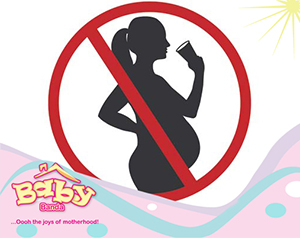During pregnancy, alcohol passes from the mother’s bloodstream through the placenta and into the baby’s bloodstream, where it can affect its development. It would take your liver about 90 minutes to break down just one unit of alcohol. The unborn child does not have a fully developed liver or the capacity to process alcohol like an adult and the placenta does not act as a barrier to protect it from the alcohol passing directly into its bloodstream. Drinking even one alcoholic beverage per day during pregnancy puts your developing baby at risk of serious birth defects. Small amounts of alcohol can cause permanent harm to the child. If you are pregnant and find yourself unable to stop drinking, seek help from your health care provider to assist.
Risks associated with taking alcohol during pregnancy
1. Fetal Alcohol Spectrum Disorder (FASD)
This is a term that broadly describes the different effects that alcohol may have on a baby during pregnancy that may include physical, mental, behavioural and learning disabilities that may last a lifetime. These symptoms may include:
• Slow growth and delays in the baby’s development
• Birth defects
• Unusual facial features
• Hyperactivity
• Irritability
• Brain and neurological disorders
• Mental retardation
• In later years, the child may have learning problems, immature behaviour, poor judgment, depression, anxiety and sexually inappropriate behaviour, attention and memory deficits, difficulty with abstract concepts (math’s, time, money) and hearing and sight problems.
2. Fetal Alcohol Syndrome (FAS)
This describes a more specific set of symptoms caused by drinking alcohol while you are pregnant. The baby may have:
• Facial deformities
• Slow or delayed growth.
• Brain and neurological problems.
During breastfeeding
Research shows that alcohol easily enters breast milk and may stay there for several hours therefore passing to your nursing baby. Unfortunately, no safe limit has been established, making it important to protect babies from exposure to alcohol. If you must drink alcohol, ensure that enough time has passed for the alcohol to have completely left your system before nursing.
Risks associated with taking alcohol during breastfeeding
• Taking alcohol may affect milk production and this can cause babies to eat less and sleep less.
• Alcohol can also affect the baby’s brain and spinal cord development which continue to grow after birth.













